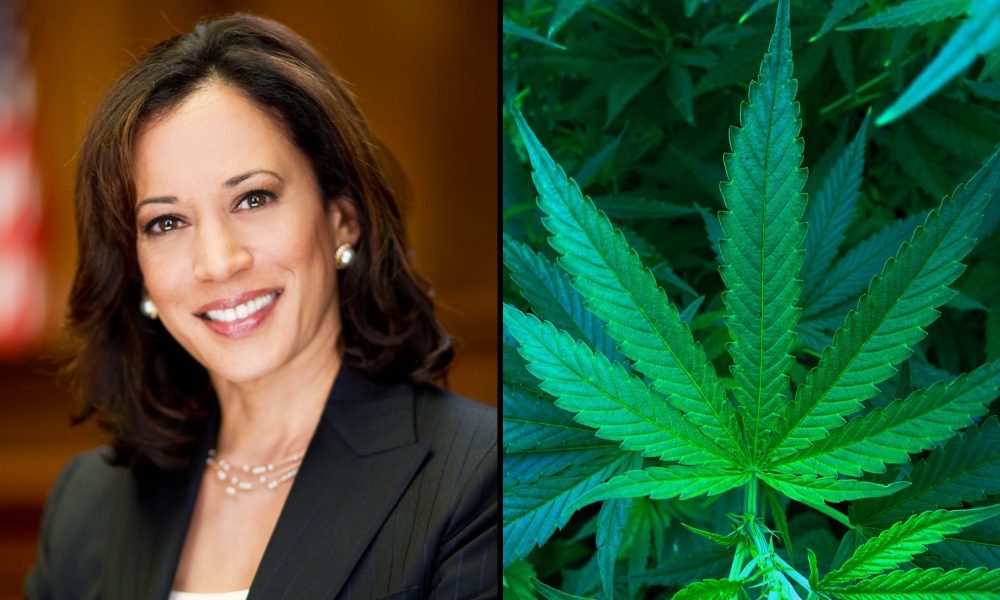Vice President Kamala Harris’s office has been reaching out to people who’ve received a pardon for marijuana possession under the president’s clemency proclamations—seeking assurance that the Justice Department certification process is going smoothly and engaging in broader discussions about cannabis policy reform, according to a pardon recipient who was contacted.
Chris Goldstein, a cannabis activist who recently received a pardon certificate after being formally forgiven for a 2014 cannabis possession case, told Marijuana Moment on Thursday that the vice president’s office reached out to him and then scheduled a meeting last Friday with three staffers to go over his certification experience and broader policy issues such as descheduling and expungements.
Goldstein said that the office was “really glad to hear” about the relative ease of the certification process, and he said he was “surprised by how up-to-speed and nice everybody was.”
Notably, the advocate said that, after he explained to staff that he was arrested for possession while protesting for marijuana legalization on federal property, the four of them then discussed the Marijuana Opportunity, Reinvestment and Expungement (MORE) Act, which is a congressional bill to comprehensively end cannabis prohibition that Harris sponsored during her time in the Senate and which passed the House twice.
“Her staff really did know the difference between rescheduling descheduling, and they were interested to talk about it,” Goldstein said, emphasizing that he initiated the conversation about broader legalization issues, not the other way around.
Good news: the Office of @VP @KamalaHarris contacted me to talk about getting one of the #marijuana possession pardons from @POTUS.
Turned into a good 30min meeting with staff covering pardons, descheduling, and careful messaging.
Refreshed hope in this old activist.
— Chris Goldstein (@freedomisgreen) February 16, 2024
Additionally, he raised the point that the pardons people received over possession did not clear their records and still need to be expunged. Goldstein said the office “absolutely heard that” and understood the “nuance” of the policy issue.
He also expressed to the staff that while he appreciates the administration’s messaging around how nobody should be in jail over marijuana, it would be more meaningful to say that nobody should be arrested over marijuana, as his own possession case involved an arrest but no jail time.
“So that was my ask. And they heard that too,” Goldstein said. “And they acknowledged that that was a difference that they had seen in their messaging on other criminal justice bills, and they acknowledged it as an interesting point to bring up for this.”
“I want to give them credit for this, because they were reaching out to pretty much anybody who they could who had gotten a pardon recently through the Department of Justice and trying to communicate with people about the pardons and make sure the process was going well,” he said. “It seemed seemed like they were really invested in making sure that people had an easy process in getting the pardons and that it was easy to apply, it was a short waiting period, all those things.”
It’s unclear why the vice president’s office is taking the lead on the pardon outreach, as opposed to that of the President Joe Biden, who issued the relief and has routinely promoted the action.
In any case, Harris’s staff didn’t make any specific commitments on future marijuana policy reform initiatives, Goldstein said, but the coordination of the meeting itself is encouraging to advocates—especially given that frustrations have pent up over the relative silence from the vice president on cannabis issues during the administration’s first term in light of her prior advocacy for legalization as a senator.
Marijuana Moment reached out to the vice president’s office for comment, but a representative was not immediately available.
Harris also faced criticism last week after sharing a video where she claimed the administration had “changed federal marijuana policy.” While Biden has issued thousands of simple possession pardons and directed the ongoing review into federal cannabis scheduling, the law itself has not changed at this point, and campaign pledges to decriminalize marijuana have yet gone unfulfilled.
Goldstein’s point to the vice president’s office about the need for expungements also gets at another point of contention for advocates, who’ve criticized Biden’s frequent claim that his pardon action meant that people had their records cleared. In fact, a pardon only constitutes formal forgiveness, but those convictions are not wiped away.
In the background of the vice president’s office outreach effort, the Drug Enforcement Administration (DEA) is in the process of completing its review into cannabis scheduling after the U.S. Department of Health and Human Services (HHS) recommended moving it from Schedule I to Schedule III under the Controlled Substances Act (CSA).
Rumors recently swirled that the DEA’s scheduling announcement would come last week, but that did not happen and a Biden administration official told Marijuana Moment that they’d “wave off” the speculation about imminent action.
Meanwhile, a recent survey found that voters’ impression of the president jumped a net 11 points after hearing about the possible implications of the rescheduling review—and that includes an 11-point favorability swing among young voters 18-25 who will be critical to his reelection bid.
Marijuana Tax Revenue Should Fund Education And Housing, Not Police And Prisons, Voters Say In New Poll
Photo element courtesy of California Attorney General’s Office.
Read the full article here

